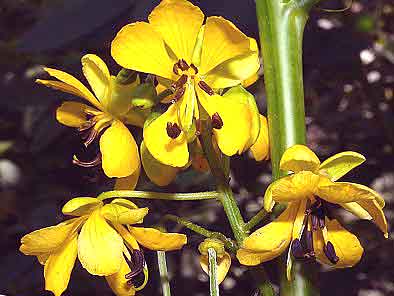Senna is a lovely shrub like plant that dies back in winter. It is very hardy once established surviving heat, humidity and drought. It produces a shrub with green - slightly blue - leaves and bright yellow flowers on stalks that can be a foot (30 cm) in height and last about a month during the hot summer. Provided it is given a well drained soil in full sun it's fairly maintenance free and easy to grow. The flowers are lovely. It can make a great flowering hedge with little or no work. The seed pods also offer winter interest for the garden. It has a strong aroma when crushed so deer and rabbits don't eat it.
Description of American Senna (Senna marilandica).
A native perennial shrub/herb hardy to zone 4. It produces tall mostly unbranching
stems up to 6 feet (1.8 m) in height. The leaves are arranged alternately along
the whole length of the stem and are compound in nature. Composed of 6 - 12
pairs of leaflets each of which are from 1¼-2½" (3.2 - 6.4
cm) long and ½-1" (1.3 - 2.5 cm) across, oblong-elliptical in shape
with smooth marine and medium green with a slight bluish tinge. In mid summer
it produces flowers at the tops of the stems and sometimes from side branches.
Flowers are produced in clusters (panicles) that can be 6 - 12" (15 - 30
cm) tall. Individual flowers are pea like, bright yellow and marked with blackish
glandular hairs. The stamens are long and have large brown anthers. Wild Senna
remains in bloom for about 3 - 4 weeks. The flowers are then followed by , long
drooping seedpods that are narrowly oblong flattened from 2- 4" (5 - 10
cm) long, with single rows of seeds (like peas or beans). These are initially
green turning brown when mature. They remain on the plant even after the plant
has died back for the winter. This provides some winter interest to the garden.
The crushed foliage is aromatic when crushed, scent is described by some as
unpleasant.
Location and Care of Wild Senna (Senna marilandica).
Wild or Maryland Senna much prefers full sun in moist but well drained soil.
It actually prefers soil with some rocks or stones in, ideally a sandy loam.
Does not really like clay soil unless it has been well modified to drain better
usually by adding sand and unusually stones. Since most gardeners are trying
to get rid of their stones, this gives you a great place to put them. Add them
to a pile of soil and plant senna on it. Stone problem solved!
Will do reasonably well in light shade but will be less vigorous than in full
sun. Once established the plants are extremely drought tolerant. It tolerates
heat and humidity very well. While Wild Senna is fairly cold tolerant it can
be killed by severe weather so in lower zones (6 and below) it is best to mulch
the plants well before winter to give added protection. Like many plants in
the pea family this plant will fix nitrogen so fertilizer is not really needed
and nearby plants may also benefit.
Growing Wild Senna (Senna marilandica) from Seed.
It is recommended that the seeds are scarified to help break the coating before
planting. To do this place seeds on a coarse sheet of sandpaper and then rub
over with a second sheet. This helps to break the coating allowing water to
penetrate more easily and enhance germination. Seeds can also be soaked for
several hours before seeding. Plant in cell pots or several to an individual
pot. Due to the hard coat seeds can take anywhere from 1 to 12 weeks to germinate,
which is why we recommend individual cell pots so seedlings can be removed without
disturbing ungerminated seeds. Pot on until large enough to grow outside. For
more details on seeding see general
growing instructions.
Harvesting Wild Senna (Senna marilandica)
The leaves are harvested before and during flowering, the pods are harvested
when fully ripe in the autumn. Both are dried for later use.
Problems.
Slugs apparently really like this plant. Otherwise it is fairly problem free.
Medicinal Uses of Wild Senna (Senna marilandica).
Both the leaves and the seedpods are used. They are an excellent cathartic (purgative
and purifier), diuretic and vermifuge. Used to treat gripe and the soaked seeds
are swallowed to treat sore throats. Infusions are used to treat fevers and
heart problems. A poultice of the root has been used in treating sores. Wild
Senna has the same properties as regular senna however its concentration of
active ingredients is slightly less so a higher dosage of this plant is required
than with regular senna.
Other names
American Senna, wild senna, Maryland Senna, native senna.








